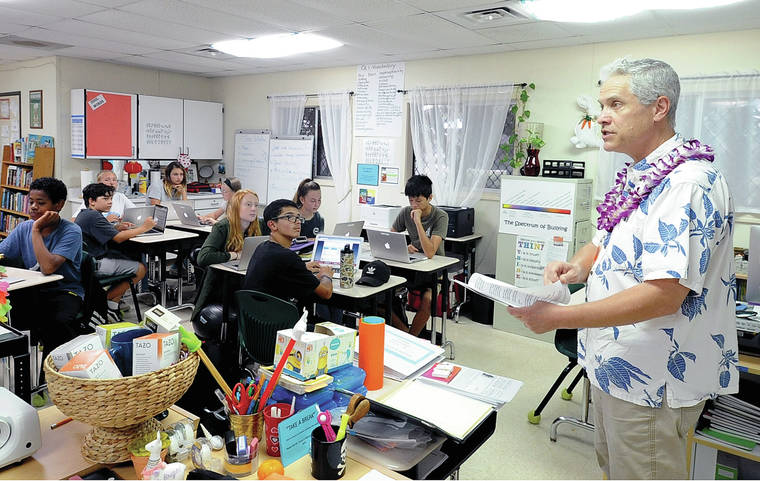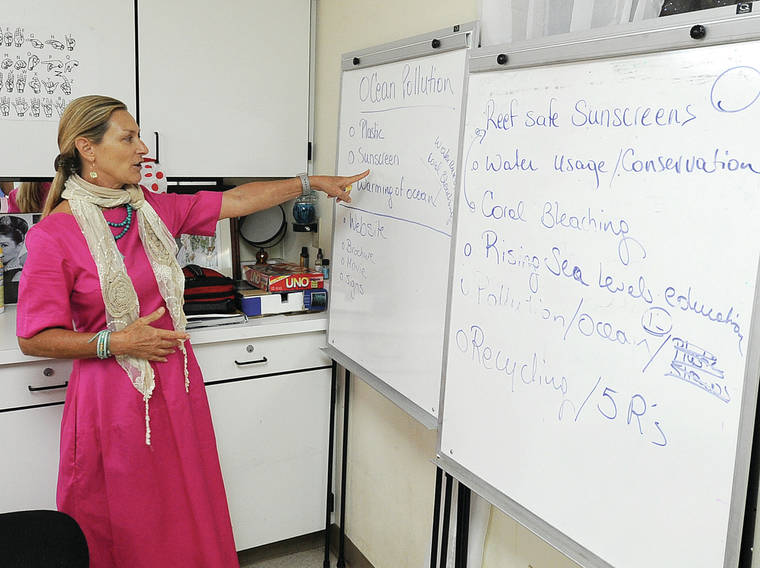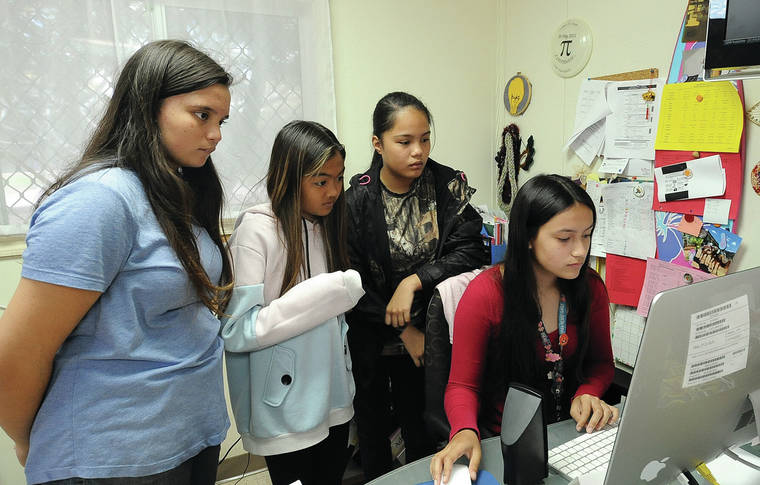Waikoloa students use multimedia platform to educate on harmful sunscreens
WAIKOLOA VILLAGE — With the state ban on selling certain sunscreens taking effect in 2021, a class of South Kohala students has been hard at work on a full multimedia campaign to raise awareness about the new law while building connections with fellow students around the globe.
On Thursday, the Global Scholars class at Waikoloa Elementary and Middle School had a chance to share their thoughts and efforts with Rep. David Tarnas (D-North Kona, South Kohala, North Kohala), who fielded questions from the classroom of constituents about the bill and what’s next for the islands’ pressing issues.
“They are fully aware of the gravity of these environmental issues that we face,” Tarnas said after the class visit. “And they’re grappling with these as problem-solvers themselves. And so I hold them in high regard.”
The class, made up of 23 students from seventh and eighth grade, is part of the Global Scholars program, which challenges students between the ages of 10-13 to spend the school year navigating some of the globe’s most pressing issues through a curriculum that connects them with peers in cities around the world via a digital classroom. The program is under the nonprofit Global Cities, itself a program of Bloomberg Philanthropies.
“This is the best program I’ve ever had,” said teacher Sylvie Bright. “And the kids run it.”
Throughout the course of the curriculum, students have the opportunity to network with students in other countries that are also participating in the Global Scholars program, giving the local youth a unique opportunity to learn from their international peers while at the same time sharing their own experiences, creating connections with students from Jakarta to Barcelona.
According to the Global Scholars website, the program is in 25 countries and 51 cities. Thirty-eight of those cities are outside the United States.
“They exchange ideas, they chat, they email each other,” said Bright. “I mean, it is like amazing to me.”
This year’s theme is the “World of Water,” in which students explore the role of water in their lives, their cities and the world at large.
As part of that program, students were able to visit with a variety of industry representatives who work with the community’s water supply and resources, through which they explored potential futures for themselves.
That work has also included a community action project, in which students have taken on an advocacy campaign to raise awareness about the sunscreen issue.
Lawmakers last year passed a bill banning the sale of sunscreens in Hawaii containing oxybenzone, octinoxate or both. It goes into effect on Jan. 1, 2021.
Groups of students each took on one of the several platforms of the campaign, including print media like brochures as well as social media.
Students also created a website — warriorsdraft.wixsite.com/oceanprotectors — developed an assembly program and created a public service announcement while another group worked to document everything for a movie project. Meanwhile, an ambassador team served as the liaisons between the Waikoloa students and their peers around the world.
Students also developed a “Pick Up Three” campaign, which challenges everyone to pick up at least three pieces of trash when they visit a beach or park.
Michelle Axelson, a member of the social media team, said their goal was getting the word out to people to start using reef-safe sunscreens.
“I think it’s an important issue because it’s becoming a problem in our world,” she said. “And if we don’t take care of it soon, then it’s probably going to get worse, and people aren’t really going to do anything about it unless we let them know that it’s actually happening.”
On the class’s Instagram page (@GlobalScholars.HI), students have posted photos of a field trip to Kawaihae Harbor, a recent sign waving — “Our first act of activism!” reads the caption— as well as updates from the class.
Bright said she hopes to get students’ brochures into hotels and hopefully airplanes, where visitors will be able to take notice. Students said getting people’s attention can do a lot for the issue.
“I think a big part of it is just raising awareness about it and convincing people, because it takes convincing them to change their own behaviors to try to accomplish something,” said student McKenzie Lyon. “Whether it’s getting better sunscreen or getting them to recycle or pick up their trash, it’s just convincing people to change their own behaviors and what they’re doing at home.”
Tarnas, who spoke to the students about the legislative process, the bill’s history and other environmental issues facing lawmakers, also emphasized that the law only bans the sale of sunscreens containing oxybenzone, octinoxate or both without a prescription, but doesn’t keep visitors from bringing it in their luggage.
That, Tarnas told the students, is why their efforts through this educational campaign are so important, a point he reiterated after the class period.
“Educational marketing to get consumers to make a conscious choice not to use these harmful sunscreens is the necessary thing,” he said. “That’s the strategy that we have to do, and that’s what they’re doing. So I’m stoked they’ve identified that.”
Student Ezekiel Kort said the most memorable part of his involvement in the program was a summit at which he was able to speak with superintendents, teachers and principals about Global Scholars and what it’s meant for him.
“It’s really given me a lot of opportunities. I mean I never would have thought I’d be able to do a PSA or anything like that,” he said, saying it’s “definitely” something other schools should consider offering for their students.
Bright too said she wants more local schools to recognize the program’s value for students.
“And if we could get more schools involved,” she said, “I’m telling you, it changes the students’ mindset.”






